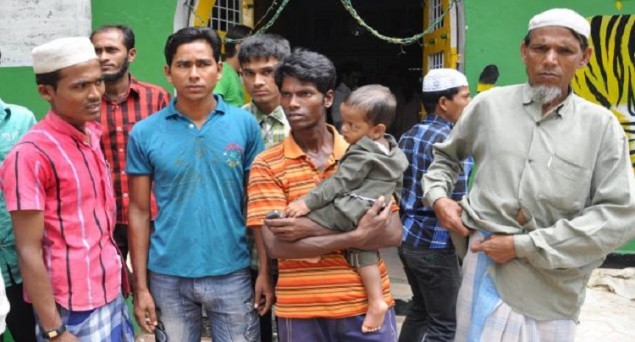IndiaTomorrow.net,
New Delhi, Sep 11: The United Nations High Commissioner for Human Rights on Monday strongly condemned the indications by the Indian government to deport Rohingya refugees from the country and said that “India cannot carry out collective expulsions, or return people to a place where they risk torture or other serious violations.” While updating the Human Rights Council on human rights issues in 40 countries, Zeid Ra’ad Al Hussein, United Nations High Commissioner for Human Rights, also strongly condemned the killing of Rohingyas in Myanmar.
“I deplore current measures in India to deport Rohingyas at a time of such violence against them in their country. Some 40,000 Rohingyas have settled in India, and 16,000 of them have received refugee documentation. The Minister of State for Home Affairs has reportedly said that because India is not a signatory to the Refugee Convention the country can dispense with international law on the matter, together with basic human compassion. However, by virtue of customary law, its ratification of the International Covenant on Civil and Political Rights, the obligations of due process and the universal principle of non-refoulement, India cannot carry out collective expulsions, or return people to a place where they risk torture or other serious violations,” said UNHCR head.
According to UNHCR, in less than three weeks over 270,000 people have fled to Bangladesh, three times more than the 87,000 who fled the previous operation. Many more people reportedly remain trapped between Myanmar and Bangladesh.
While condemning the violence in Myanmar he said: “The operation, which is ostensibly in reaction to attacks by militants on 25 August against 30 police posts, is clearly disproportionate and without regard for basic principles of international law. We have received multiple reports and satellite imagery of security forces and local militia burning Rohingya villages, and consistent accounts of extrajudicial killings, including shooting fleeing civilians.”
ALSO READ: Violence Against Rohingyas in Myanmar Textbook Example of Ethnic Cleansing: UN Body
“I am further appalled by reports that the Myanmar authorities have now begun to lay landmines along the border with Bangladesh, and to learn of official statements that refugees who have fled the violence will only be allowed back if they can provide “proof of nationality”.”
“The Myanmar Government should stop claiming that the Rohingyas are setting fire to their own homes and laying waste to their own villages. This complete denial of reality is doing great damage to the international standing of a Government which, until recently, benefited from immense good will. I call on the Government to end its current cruel military operation, with accountability for all violations that have occurred and to reverse the pattern of severe and widespread discrimination against the Rohingya population. I strongly urge the authorities to allow my Office unfettered access to the country,” he said.
UNHCR head appreciated the government of Bangladesh to allow in refugees from Myanmar.
“In Bangladesh, I encourage the Government to maintain open borders for the Rohingya refugees, and I urge the international community’s support in helping the authorities receive and better assist the refugee population. Turning to the domestic situation in Bangladesh, I appreciate the Government’s constructive engagement with my Office, and I would like to continue to work with the authorities to address the range of very serious human rights issues in the country,” said Hussein.
In his report, he mentioned the killing of journalist Gauri Lankesh and condemned intolerance and violence in the name of cow.
“I am also dismayed by a broader rise of intolerance towards religious and other minorities in India. The current wave of violent, and often lethal, mob attacks against people under the pretext of protecting the lives of cows is alarming. People who speak out for fundamental human rights are also threatened. Gauri Lankesh, a journalist who tirelessly addressed the corrosive effect of sectarianism and hatred, was assassinated last week. I have been heartened by the subsequent marches calling for protection of the right to freedom of expression, and by demonstrations in 12 cities to protest the lynchings.”
UNHCR chief also expressed concern on intolerance towards minorities in Pakistan.
“In Pakistan, the authorities often encourage intolerance for minorities or minority views, with sometimes deadly consequences. Many journalists and human rights defenders face daily threats of violence. Even allegations of blasphemy, or suggestions that blasphemy laws require revision to comply with the right to freedom of thought and religion can lead to vigilante violence,” he said.





